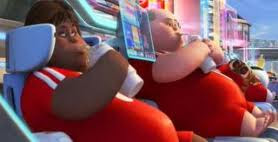 |
| Can life possibly get better than being aboard the Axiom? |
In fact, you can make your own math if you want. Just imagine a new world or universe and make up your own rules.
Dashbo's world: (or we could say Dashbo theory)
1. Gravity works the same as on Earth except that it pulls things to the right instead of down.
2. The only primary colors are yellow, pink, and green.
3. When things melt, they change color by losing the yellow they might have had. and when they evaporate, they change color by losing whatever green hues they might have had
You get the idea. Once I pick all my rules for my imaginary place, then I take an imaginary object and put it in there and see what happens:
Lets say my object for sure has a right and a left side. Well then we know which direction gravity will be pulling it. If I spin my object, then gravity will do all sorts of weird things to it. I imagine it will probably make a spiral path outward. We call that a conjecture. But can I prove it? If I can, then it is no longer a conjecture, but now it is a theorem. Have you ever heard of the Pythagorean theorem? That is something that has been proved always true (in the imaginary world that some math dude invented called euclidean geometry) Euclid had five rules that he made up. Math people spend a lot of time trying to prove conjectures into theorems or trying to take theorems and re-prove them in new ways. And the only thing you get are the axioms at first. (but if somebody proved a theorem from the axioms, then you can always use that theorem to prove your theorem.)
So can you prove an axiom? NO! axioms are unprovably TRUE for your world! They just EXIST. Trying to prove them is like trying to tell a deaf person what the note B flat sounds like. If you said to yourself: "well he might not have always been deaf, what about Beethoven? He was a deaf composer dude!" Then you should probably go to someone else's blog. If this was a building, then the axioms would be the most base fundamental bedrock that you build everything else (theorems and conjectures) on. If you take your world and start chucking axioms, then your theorems fall down in a heaping crumbly (and probably toxic) mess.
Set theory is a math world based off of real life situations. You have heard of a set right? (I heard once that in English, "set" has the most definitions than any other word. You can set the table, you can set something up, get ready, get set, go!) I am talking about the kind of set that is a collection. Like your mom's set of fine china or your set of matching Elvis figurines. So set theory's axioms or rules are based off of what people noticed about sets. Can one object be in more than one set? Can one set exist entirely in another? Can two sets be entirely separate where they don't share anything? I am pretty sure you have seen a Venn diagram. They look like this:
This is a really slick way to represent sets! You can easily tell where to look if I asked for everything in both C and B or everything NOT in B etc.
So in math, we use numbers a lot. someone decided it would be easier to make some sets out of them. here are a few of the most used number sets:
All positive numbers
All negative numbers
All whole numbers (includes positive, negative and zero)
All natural numbers (or counting numbers. it includes one and then all the whole numbers bigger than one)
Imaginary numbers (it turns out they are just as real as any other number really. Who knew?)
Real numbers (this set is really really big. In fact, some sets are infinite and yet this set is bigger than those sets)
Rational numbers (that would be fractions)
etc.
You can make your own number sets if you want. I don't really know why you would though. If you do, let me know what it is and why you decided to make that set in the first place.


No comments:
Post a Comment